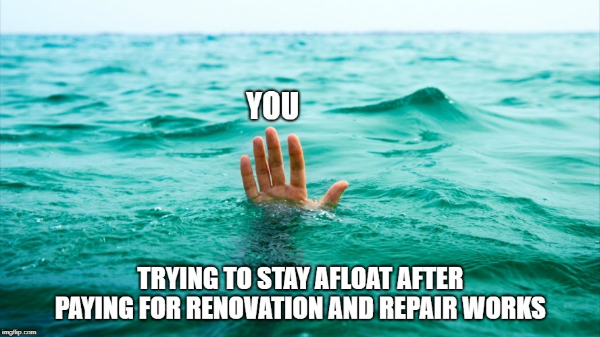Investing in real estate is not without its risks, but the potential rewards of a steady stream of rental income or profits on a sale, investors reckon, are well worth it.
Indeed, real estate investments are a popular investment type because although the value may fluctuate, there’s an actual physical asset backing any loan.
However, given the amount of money at stake here, the losses can often be significant.
So, if you’re planning to invest in real estate, it’s important to consider the inherent risks that can make or break your plans.
Here are some of the reasons as to when investing in real estate would be a bad idea.
1) If Your Debt Is Too High
When thinking of a large purchase like real estate, it’s important to consider your risk appetite, current debt situation and your cash on hand.
Some people are comfortable with a high level of debt, while others get anxiety at the mere thought.
As general rule of thumb though, you should keep your debt within the 30% – 40% range. But of course, every bank has their own distinct requirements depending on the individual.
Here is how you calculate your debt service ratio (DSR): Add up your monthly debts and divide them by your gross monthly income, which is the amount earned before taxes and other deductions.
2) If You Can’t Afford The Down Payment

The down payment on a property is typically fixed at a minimum of 10% of the total value of the property, but this can vary depending on your bank or lender.
Buying a house is a huge financial decision, so it’s important to evaluate your financial situation before considering an investment in real estate.
What’s your current salary? Are you expecting a raise in the short term? What are your monthly expenses? How much have you saved? Why are you investing in real estate with limited resources or no money?
Asking yourself these questions is a good way to understand your financial capacity.
Those on a tight budget may consider withdrawing funds from their EPF 2 account, but this can only be done after receiving the sale and purchase agreement.
And if you simply cannot afford the down payment, then it may be best to put off your home buying to a later time.
3) If You Need To Borrow From Too Many Sources
Another thing home investors should be wary about is borrowing from multiple sources.
In such a scenario, borrowers apply for several short-term loans, each having similar interest rates and repayment terms.
Having multiple loans is bad news because it can negatively impact your ability to make loan payments, leading to you defaulting on one or many of them.
Ultimately, this will adversely affect your credit rating, making it harder for you to secure another loan in the future.
Beyond this, loan applications are not free. Many banks and lenders charge a processing fee, which is non-refundable in most cases. So, applying for multiple loans increases your non-refundable costs.
4) Good ROI Versus Bad ROI
For any property investor, the ultimate goal is to get their money’s worth from a real estate investment. Typically, a property’s return on investment is its income minus expenses.
So, say you invested RM100,000 in a property, and the total profits you made were about RM130,000. In this example, your return on investment is:
ROI = 130,000 – 100,000/100,000 = 0.3% = 30%
But there several factors that determine a property’s true value, many of which change over time, so here’s a helpful way to assess your property’s true ROI:
The rental income a property is expected to generate. As a rule, one must assume properties will be occupied about 90% of the time and that rent will increase 3-5% annually.
Financing costs such as your loan payments is another variable to consider when determining ROI on a property
Beyond this, property owners should include miscellaneous items such as property taxes, insurance, maintenance, management expenses and utilities to accurately calculate ROI.
5) Homes That Require Loads Of Repair And Renovation
Another key factor that property investors need to consider in order to make money in real estate is the age of a house.
The last thing you want is to be saddled with a home that requires loads of repair work and renovation!
Some things to look out for before making a decision are:
Older homes are prone to a variety of structural problems, such as major cracks, corrosion, dry rot, or moisture damage in pilings.
When house hunting, look out for doors that jam or fail to latch, mould and cracks in the wall, stuck windows and uneven floors.
Before buying an older home, make sure to ask the seller about the plumbing system. Brass and copper pipes tend to last 50 years, while steel pipes can get damaged sooner.
Homes in Malaysia are prone to mould and mildew issues because of excessive exposure to moisture.
This is a major health hazard for young children and adults, and can lead to serious infections. If left unchecked, mould can lead to structural problems, making it impossible to live in.
Termites can also damage homes, especially those with significant wood components.
Watch out for sagging floors, hollow-sounding floorboards and peeling paint as these could all be signs of termite damage.
6) Homes Where Tenants Are Hard To Come By
It’s hard enough finding reliable tenants by any measure. Don’t make your life harder by quoting too high a rent or purchasing a luxury home in a downturn.
Do your research and look at nearby rental units with similar amenities to see how much they’re charging. Here are some things to consider when determining how much rent to charge:
- Cover your operating expenses
- Charge a competitive rate
- Ensure you earn a decent ROI
Location is another factor to consider. Are there good schools around your area? What is the crime rate like? Is your home accessible by public transport?
Some of these issues can be easily rectified, but others are less so and might require a rethink altogether.
As with any big-ticket purchase, don’t rush into buying a home! Before investing in a property, take the time to do research, and read up on how to invest successfully with rental properties to get a rough idea of what to expect.
Keep Track of New Launches
Visit our new launches page to find the new launch project of your dreams and submit an enquiry today.

Disclaimer: The information is provided for general information only. PropertyGuru International (Malaysia) Sdn Bhd makes no representations or warranties in relation to the information, including but not limited to any representation or warranty as to the fitness for any particular purpose of the information to the fullest extent permitted by law. While every effort has been made to ensure that the information provided in this article is accurate, reliable, and complete as of the time of writing, the information provided in this article should not be relied upon to make any financial, investment, real estate or legal decisions. Additionally, the information should not substitute advice from a trained professional who can take into account your personal facts and circumstances, and we accept no liability if you use the information to form decisions.







